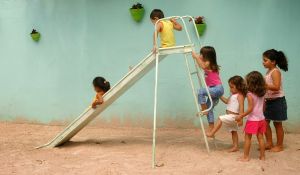Although it seems like a contradiction, for kindergarten readiness and academic success children need to be able to regulate their behavior and have some basic early skills to make friends (Bodrova & Long, 2005). Research is showing that children who are more comfortable socially also have higher marks and those with poor social skills are at risk for academic concerns. What this means is that it is important to support children to develop social skills and the playground, where kids are having fun with others their age, is a great place to practice.

Taking turns is a simple place to start with little ones. If there is someone in line to go down the side, we can help others to tuck in behind. It’s not easy to wait so we need to recognize children’s efforts that they are taking turns. A quick “I see that you are taking turns,” and a high five may be all that is needed.
Another important social skill is learning to wait. Often, there are more kids that would like to swing than there are swings so kids have to wait until someone else gets off. We might think that being patient is a personality trait but it is a skill that grows with practice. Waiting is easier with some strategies such as doing something else. Give your child some options, such as running to the fence and back 3 times or pretending to be an airplane flying around or some other activity. Even a minute or two can seem to be a long time to a child but those minutes will pass by much quicker with something else to do.
A playground is a big space, but there are still opportunities for kids to share. Kids might need to share the sandbox with other kids, or the platform space at the top of the ladder. Sometimes sharing is hard to do, so it helps to recognize kids for trying.
These 3 social skills are ones that kids will likely need every day, as do adults! (Tomorrow’s post will include ideas for making friends.) Playgrounds are spaces for more than just physical activities, but social ones too. Are there other kids at the playground where your child plays?
